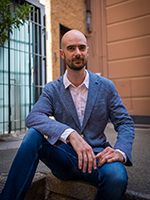Alberto Acquilino

Email: aacquili@uwo.ca
Alberto Acquilino is a Postdoctoral Fellow at the Don Wright Faculty of Music at Western University, where he works under the supervision of adam bell. His career reflects an uncommon blend of artistry and science, uniting his training as a musician with his expertise in engineering and technology. After earning a degree in music performance from the Paganini Conservatory of Music in Italy, he established himself as a performer, conductor, and music educator. At the same time, he pursued his interest in engineering, completing two master’s degrees in mechanical engineering in Italy and France and conducting research at ETH Zurich in Switzerland.
Acquilino went on to earn a PhD in Music Technology at McGill University in the Computational Acoustic Modeling Laboratory. His doctoral research explored how digital technologies can enrich instrumental pedagogy, leading to the creation of open-source frameworks for real-time feedback and adaptive learning in music education. This work laid the foundation for his current postdoctoral research, which examines how generative AI and disability-led design can support the acquisition of sensorimotor skills in musicians, with a particular emphasis on accessibility and inclusion in music classrooms.
In addition to his research, Acquilino has been active as a teacher and mentor. He served as a Lecturer in Music Technology at McGill University, where he also gave guest lectures in music education classes on brass pedagogy, advanced wind techniques, and educational applications of technology. He is currently a member of the Academic Board of the Global Leaders Institute MBA, teaching courses on emerging technologies for innovation and contributing to the conference series The Musician as Innovator.
Acquilino’s work extends well beyond the university setting. As a Lead Mentor with the Neuroinformatics Coordinating Facility for the Google Summer of Code program, he guides international open-source initiatives dedicated to developing adaptive and inclusive music-learning tools. Across his teaching, research, and community engagement, he is committed to bringing together artistic practice, technological innovation and social impact to foster accessible and equitable music education.

